The Life and Achievements of Lenin: Revolutionary Thought and His Impact on the Russian Revolution and Contemporary Politics
イントロダクション
レーニンはロシア革命の主導者として知られるが、彼の生涯と業績には多くの興味深い側面がある。
彼の思想は革命家たちに大きな影響を与え、ロシア革命は現代政治にも重要な影響を与えた。
レーニンの生涯と業績を探ることで、彼の思想や行動の背後にある要因を理解することができるだろう。
また、彼の業績が現代政治にどのような影響を与えているのかも考察していく。
レーニンの生涯と業績について知ることは、革命と政治の歴史に興味を持つ人々にとって貴重な情報源となるだろう。
Introduction
Lenin is renowned as a leader of the Russian Revolution, yet his life and achievements hold many intriguing aspects.
His ideas profoundly influenced revolutionaries, and the Russian Revolution left a significant mark on contemporary politics.
Exploring Lenin’s life and accomplishments helps us understand the factors behind his thoughts and actions.
Moreover, it prompts an examination of how his achievements continue to shape modern politics.
Understanding Lenin’s life and achievements serves as a valuable resource for those interested in the history of revolution and politics.
レーニンの生涯と業績
概要
レーニンの生涯と業績について、彼の思想やロシア革命、そして現代政治への影響について説明します。
まず、レーニンの出生から青年期までについてです。
彼は貧しい農民の家庭に生まれましたが、優れた知識を身につけることができました。
彼の青年時代は、社会的な不平等や労働者の搾取に対する不満から、革命家としての道を歩むことを選びました。
次に、レーニンの革命家としての活動についてです。
彼は初期の活動を通じて、社会主義の理念を広めることに力を注ぎました。
また、ロシア社会民主労働党の分裂や労農民主独裁論の提唱など、彼の思想は次第に進化していきました。
さらに、第一次世界大戦や『帝国主義論』の発表によって、レーニンの影響力はさらに広がりました。
彼は二月革命の後、ロシアへの帰国と四月テーゼの発表を行い、十月革命によって権力を掌握しました。
レーニンの権力獲得以降の活動では、人民委員会議の発足や各種改革の実施など、彼は社会主義国家の建設に努めました。
しかし、チェーカーの創設や反富農運動、赤色テロなどの強力な手段も使われました。
彼の死後、レーニンの影響はソ連内外に広がりました。
彼の政治思想はソ連の政治体制や社会主義運動に大きな影響を与え、国際的な影響力も持ちました。
彼の評価は賛否が分かれていますが、彼の革命的な思想と行動は多くの人々に影響を与えたことは間違いありません。
最後に、レーニンの政治思想や人物像、筆名、著作についても触れられています。
彼の全集や参考文献、外部リンクも紹介されています。
以上が、レーニンの生涯と業績についての概要です。
彼の思想と行動は、革命家の思想やロシア革命、そして現代政治に大きな影響を与えたと言えます。
Lenin’s Life and Achievements
Overview
This article explores Lenin’s life and achievements, discussing his ideas, the Russian Revolution, and his influence on contemporary politics.
Firstly, it covers Lenin’s early life from birth to his youth. Born into a poor peasant family, he managed to acquire exceptional knowledge. His youth was marked by discontent with social inequality and worker exploitation, leading him to embrace the path of a revolutionary.
Next, it delves into Lenin’s activities as a revolutionary. He dedicated himself to promoting socialist ideals through early activism. His thoughts evolved over time, evident in the split of the Russian Social Democratic Labour Party and advocacy of proletarian dictatorship.
Further, his influence expanded with the outbreak of World War I and the publication of “Imperialism: The Highest Stage of Capitalism”. After the February Revolution, Lenin returned to Russia, issued the April Theses, and seized power in the October Revolution.
Following Lenin’s assumption of power, he focused on constructing a socialist state through the establishment of the People’s Commissariats and various reforms. Nevertheless, he also employed strong measures such as founding the Cheka, the anti-kulak campaign, and the Red Terror.
After his death, Lenin’s influence extended both within and outside the Soviet Union. His political ideology significantly shaped the Soviet political system and socialist movements internationally.
While opinions about him vary, Lenin’s revolutionary ideas and actions undoubtedly influenced numerous individuals.
Lastly, the article touches upon Lenin’s political ideology, persona, pseudonyms, and writings, with references to his collected works, literature, and external links.
In conclusion, Lenin’s ideas and actions left a profound impact on revolutionary thought, the course of the Russian Revolution, and contemporary politics.
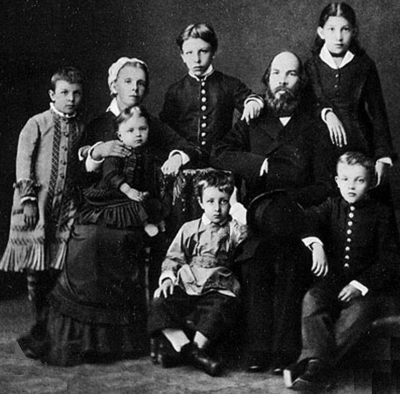
“The Ulyanov Family Photograph: Lenin at the Bottom Right”
レーニンの出生から青年期まで
レーニンは1870年にロシアのシモンヴォカ村で生まれました。
彼の本名はウラジーミル・イリイチ・ウリヤノフであり、後に「レーニン」という筆名で知られるようになりました。
彼は裕福な家庭に生まれ、父親は教育者でした。
家族は教育に重点を置き、レーニンは幼少期から勉学に励んでいました。
“From Birth to Youth: Lenin”
Lenin was born in 1870 in the village of Simbirsk in Russia.
His birth name was Vladimir Ilyich Ulyanov, and he later became known by the pseudonym “Lenin.”
Born into an affluent family, his father was an educator.
Education was emphasized in his family, and Lenin devoted himself to learning from a young age.
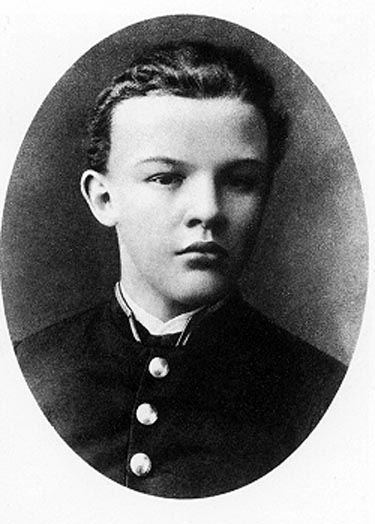
“Vladimir Ulyanov in 1887”
青年期になると、彼はマルクス主義の思想に強く影響を受け、社会主義者としての道を歩むことを決意しました。
彼は大学で法学を学びながら、政治活動にも積極的に参加しました。
彼の政治活動は次第に過激化し、結果として彼は政府から追放されることになりました。
しかし、彼は追放後も政治活動を続け、ロシア社会民主労働党の指導者として活躍しました。
レーニンの出生から青年期までの経験は、彼の後の活動に大きな影響を与えました。
彼は革命家としての信念を固め、ロシア革命と現代政治への影響を築くために努力しました。
次の記事では、彼の革命家としての活動について詳しく見ていきます。
“In His Youth, Vladimir Ulyanov Embraces Socialist Ideals and Political Activism”
“Heavily influenced by Marxist thought during his youth, he resolved to pursue a path as a socialist.”
“While studying law at university, he actively engaged in political activities.”
“His political involvement gradually intensified, leading to his eventual exile by the government.”
“Yet even after exile, he continued his political pursuits and emerged as a leader within the Russian Social Democratic Labour Party.”
“Ulyanov’s experiences from birth through his youth significantly shaped his subsequent actions.”
“Solidifying his convictions as a revolutionary, he dedicated himself to shaping the impact of the Russian Revolution and modern politics.”
“In the following article, we will delve into his activities as a revolutionary in more detail.”
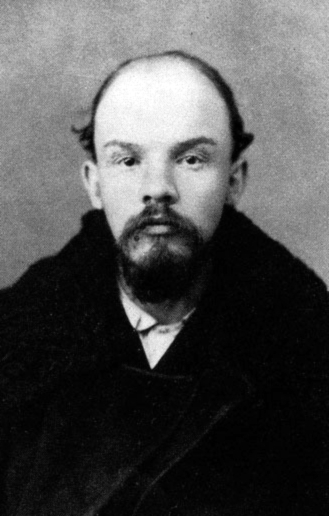
“Lenin in 1895”
レーニンの革命家としての活動
レーニンは、革命家としての活動を通じて、ロシア革命に大きな影響を与えました。
彼の初期の活動は、ロシア社会民主労働党の分裂につながりました。
彼はロシア第一革命で労農民主独裁論を唱え、第一次世界大戦では『帝国主義論』を発表しました。
“Lenin’s Revolutionary Activities”
Through his revolutionary activities, Lenin significantly influenced the Russian Revolution.
His early efforts led to the split in the Russian Social Democratic Labour Party.
During the Russian First Revolution, he advocated for the dictatorship of the proletariat, and during World War I, he published “Imperialism, the Highest Stage of Capitalism.”
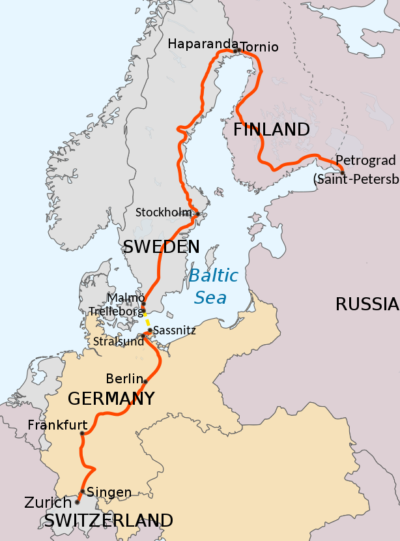
The Route Lenin Took from Zurich, Switzerland to Petrograd, Russia (Red Line)
When Lenin returned from Zurich, Switzerland to Petrograd, Russia, he traveled using a “sealed train” that allowed no contact with German citizens while passing through German Empire territory.
さらに、二月革命後にロシアに帰国し、四月テーゼを発表しました。
そして、彼は十月革命によって権力を掌握しました。
権力獲得以降、レーニンは人民委員会議の発足や憲法制定議会の解散など各種改革を実施しました。
彼はまた、ブレスト=リトフスク条約の締結やチェーカーの創設、反富農運動や赤色テロなども行いました。
彼はロシア内戦やポーランド・ソビエト戦争にも関与し、さらにコミンテルンを創設しました。
彼は飢饉や新経済政策の導入、宗教弾圧なども行いました。
しかし、健康の悪化やスターリンとの対立が生じ、ソ連の形成とグルジア問題にも関わりました。
最終的にはレーニンは死去し、葬儀が行われました。
レーニンの活動は、ソ連内外に大きな影響を与えました。
彼の政治思想は、ソ連において重要な位置を占めていました。
彼の人物像や筆名、著作についても多くの研究がされています。
【参考文献】
- レーニン全集
- レーニンの生涯と業績に関する文献
- Furthermore, Lenin returned to Russia after the February Revolution and issued the April Theses. Subsequently, he seized power during the October Revolution. Following his acquisition of power, Lenin implemented various reforms such as the establishment of the Council of People’s Commissars and the dissolution of the Constituent Assembly. He also negotiated the Treaty of Brest-Litovsk, established the Cheka (secret police), conducted anti-kulak campaigns, and oversaw the Red Terror. Lenin was involved in the Russian Civil War and the Polish-Soviet War, and he founded the Comintern (Third International). He initiated policies including famine relief efforts, the introduction of the New Economic Policy (NEP), and religious suppression. However, his health deteriorated, leading to conflicts with Stalin and involvement in the formation of the Soviet Union and the Georgian issue. Ultimately, Lenin passed away, and his funeral was held. Lenin’s activities had a significant impact both within and outside the Soviet Union. His political ideology held a crucial position in Soviet governance, and numerous studies have been conducted on his persona, pseudonyms, and writings.
- References
- Collected Works of Lenin
- Literature on Lenin’s Life and Achievements
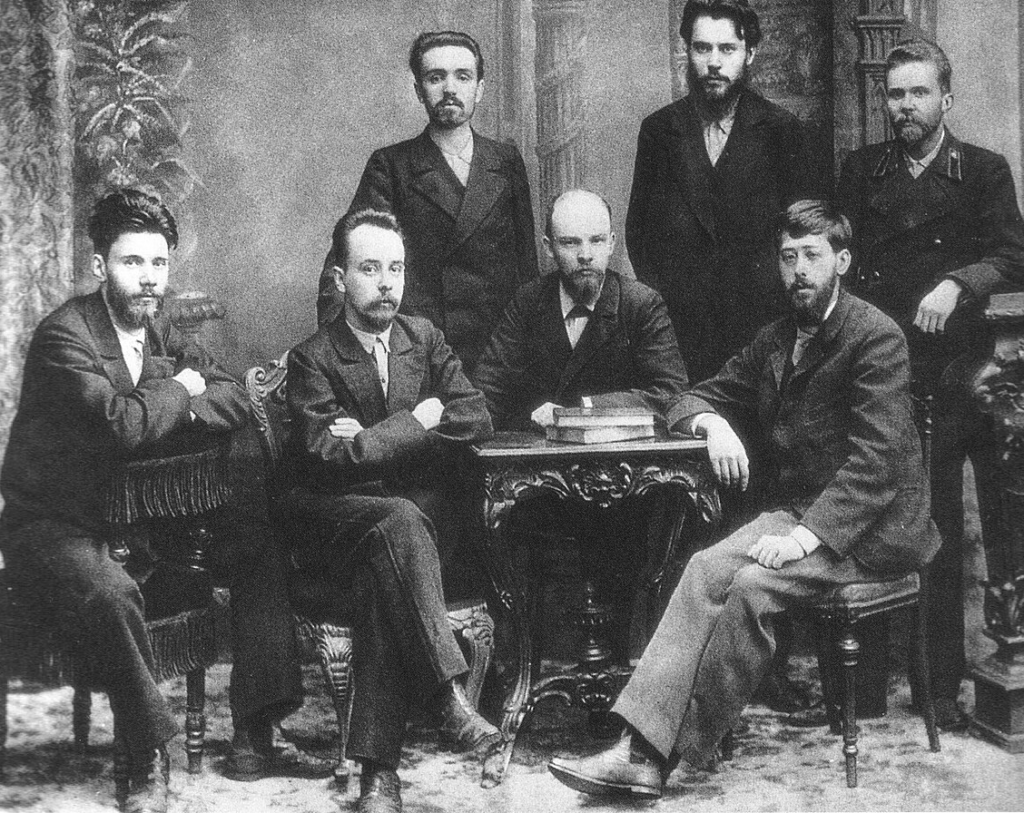
Vladimir Ulyanov (center) with other members of the Union for the Struggle of the Working Class (1897)
レーニンの権力獲得以降の活動
レーニンは権力を掌握した後も、多くの活動を展開しました。
まず、彼は人民委員会議を発足させ、憲法制定議会を解散させました。
そして、各種の改革を実施しました。
また、彼はブレスト=リトフスク条約の締結を行い、ロシアの戦争からの脱退を実現しました。
さらに、彼はチェーカーという秘密警察を創設し、反富農運動や赤色テロを行いました。
その後は、ロシア内戦やポーランド・ソビエト戦争に取り組みました。
また、彼はコミンテルンという国際的な共産主義組織を創設し、他国への革命支援を行いました。
さらに、飢饉の対策として新経済政策を導入し、宗教弾圧も行いました。
しかし、彼の健康は悪化し、スターリンとの対立も深まりました。
最終的には、彼の死と葬儀が行われました。
レーニンの権力獲得以降の活動は、彼の指導力と影響力を示すものであり、彼の政治思想や人物像にも大きな影響を与えました。
レーニンの影響と評価
レーニンの業績は、ソ連において大きな影響を与えました。
彼の指導の下、ロシアは一党制の社会主義国家となり、社会主義の理念を実現しようとしました。
また、彼の革命思想は国際的にも影響を与え、多くの国で社会主義運動が起こりました。
レーニンの評価は賛否が分かれています。
彼の指導の下でソ連は急速な工業化を達成し、貧困層の生活水準を向上させた一方で、政治的な弾圧や経済的な困難も生じました。
彼の手法や政策には批判の声もありますが、社会主義思想の普及や労働者の権利の向上に貢献したことは評価されています。
レーニンの政治思想は、マルクス主義を基盤にしています。
彼は労働者階級を中心とした革命を唱え、労働者の権利や平等を追求しました。
また、彼の人物像は革命家としての厳格さや行動力が特徴的であり、彼の指導力によってソ連の建国が実現しました。
レーニンは様々な筆名を使用しており、その中でも有名なものには「ニコライ・レーニン」という名前があります。
彼は多くの著作を残し、『帝国主義論』や『国家と革命』などは特に有名です。
以上がレーニンの生涯と業績、そして彼の影響と評価についての概要です。
彼の思想や指導力は現代政治においても一定の影響力を持ち続けています。
Activities Following Lenin’s Seizure of Power
After seizing power, Lenin engaged in numerous activities that showcased his leadership and influence.
Firstly, he established the Council of People’s Commissars and dissolved the Constituent Assembly.
He implemented various reforms and concluded the Treaty of Brest-Litovsk, enabling Russia’s exit from the war.
Additionally, he founded the Cheka secret police and conducted anti-kulak campaigns and Red Terror.
Subsequently, he participated in the Russian Civil War and the Polish-Soviet War.
Moreover, he founded the Comintern, an international communist organization, and supported revolutions in other countries.
He also introduced the New Economic Policy to address famine and enforced religious suppression.
However, his health deteriorated, and tensions with Stalin deepened.
Ultimately, his death and funeral were solemnized.
Lenin’s activities after seizing power underscore his leadership and influence, profoundly shaping his political ideology and persona.
Impact and Assessment of Lenin
Lenin’s achievements had a profound impact within the Soviet Union.
Under his leadership, Russia became a single-party socialist state striving to realize socialist ideals.
His revolutionary ideas also influenced internationally, sparking socialist movements in many countries.
Assessments of Lenin vary widely.
Under his leadership, the Soviet Union achieved rapid industrialization and improved living standards for the working class, but also faced political repression and economic challenges.
While his methods and policies have faced criticism, he is acknowledged for advancing socialist ideology and labor rights.
Lenin’s political ideology is rooted in Marxism.
He advocated for proletarian revolution, pursuing labor rights and equality.
His persona is characterized by strict revolutionary fervor and decisive action, instrumental in the founding of the Soviet Union.
Lenin used various pseudonyms; among the most famous is “Nikolai Lenin.”
He left a significant body of work, with notable publications such as “Imperialism, the Highest Stage of Capitalism” and “State and Revolution.”
This concludes the overview of Lenin’s life, achievements, impact, and assessment.
His ideas and leadership continue to wield influence in contemporary politics.

In 1908, Lenin conducted research at the British Museum Reading Room in London (pictured).
レーニンの政治思想
レーニンは、マルクス・エンゲルスの思想を基に、ロシア革命を達成するための戦略を提唱しました。
彼は、労働者階級の指導者としての役割を果たすことを信じ、プロレタリア独裁を主張しました。
彼の政治思想は、労働者階級の解放と社会主義の実現に向けた闘争を中心に据えていました。
レーニンは、ロシア社会民主労働党の指導者として活動し、党の分裂後はボリシェヴィキとして知られるようになりました。
彼は、ロシア第一革命の際には労農民主独裁論を唱え、労働者と農民の連帯を重視しました。
また、第一次世界大戦中には『帝国主義論』を発表し、帝国主義の根源として資本主義を批判しました。
十月革命による権力掌握後は、レーニンは人民委員会議の議長として各種改革を実施しました。
彼は、ブレスト=リトフスク条約の締結やチェーカーの創設など、革命の勝利を確固たるものとするための手段も講じました。
また、ロシア内戦やポーランド・ソビエト戦争にも直面しましたが、コミンテルンの創設により国際的な革命運動を支援しました。
レーニンの政治思想は、彼の死後もソ連において大きな影響を与えました。
彼の指導の下で形成されたソ連は、社会主義国家としての地位を確立しました。
また、彼の思想は国際的にも広く受け入れられ、他の共産主義国家や左派運動にも影響を与えました。
レーニンの政治思想は、彼の個人的な特徴や経歴とも密接に関連しています。
彼は健康の悪化やスターリンとの対立、そしてグルジア問題に直面しました。
彼の死後、ソ連はスターリンの指導の下でさらに発展しましたが、レーニンの遺産はその後のソ連の歴史に大きな影響を与えました。
レーニンの政治思想は、彼の著作を通じても理解することができます。
彼の全集には、彼の主要な著作や演説が含まれており、彼の思想を深く探求することができます。
レーニンの政治思想は、彼の生涯と業績だけでなく、彼の人物像や評価とも密接に関連しています。
彼は革命家としての熱意と決意を持ち、社会主義の実現に向けて闘い続けました。
彼の評価は賛否が分かれていますが、彼の影響力は今なお大きく、彼の政治思想は現代政治においても議論の的となっています。
レーニンの人物像
レーニンは、ロシア革命の指導者として知られる革命家であり、その政治思想や業績は現代政治にも大きな影響を与えています。
彼は1870年にシモンヴォ村で生まれ、出自は中流階級でした。
幼少期から教育に熱心であり、青年期にはマルクス主義に傾倒しました。
レーニンは、社会主義の実現を目指し、ロシア社会民主労働党の結成に尽力しました。
しかし、党内の意見の対立が深まり、分裂を引き起こしました。
彼はロシア第一革命の際に労農民主独裁論を提唱し、第一次世界大戦では『帝国主義論』を発表しました。
また、二月革命の後にロシアへ帰国し、十月革命を指導して権力を掌握しました。
権力獲得後は、人民委員会議の発足や各種改革の実施など、多くの政策を推進しました。
しかし、飢饉や宗教弾圧などの強硬な政策も取り入れ、一部では赤色テロと呼ばれる暴力行為も行われました。
レーニンの死後は、彼の指導者としての地位を巡る権力闘争が起きました。
そして、スターリンが後継者となり、ソ連が形成されました。
彼の業績と思想は、ソ連内外に大きな影響を与えました。
特にコミンテルンの創設や国際的な社会主義運動の推進など、国際的な影響力も持ちました。
評価については、賛否が分かれています。
彼の指導によりソ連が発展した一方で、強権的な政治手法や個人崇拝の傾向も指摘されています。
レーニンは多くの著作を残し、その中でも『国家と革命』や『帝国主義論』が特に有名です。
彼の思想は、今なお研究や議論の対象となっています。
彼の人物像は、革命家としての決断力や指導力、そして強固な政治思想によって特徴付けられます。
彼の名前は、現代政治の歴史において忘れることのできない存在です。
レーニンの筆名
レーニンは本名をウラジーミル・イリイチ・ウリヤノフといい、多くの人々に知られています。
しかし、彼は革命活動を行う際には「レーニン」という筆名を使用していました。
この筆名の由来は、彼がシベリアでの流刑生活を送っていた頃に使っていた「レーニンゴリツキー」という村の名前に由来しています。
彼はこの筆名を使用することで、自身の本名を隠し、政治活動を行っていました。
レーニンの筆名は、彼の革命活動が広く知られるようになるとともに、彼の思想や理念とも深く結びついていきました。
彼の筆名は、革命家としての彼の存在を象徴するものとなりました。
レーニンの筆名は、彼の著作や演説などの多くの文書にも使用されています。彼
はこの筆名を通じて、自身の思想を広く世に知らしめることに成功しました。
レーニンの筆名は、彼の死後も多くの人々に影響を与え続けています。
彼の思想や理念は現代の政治においても引用され、議論の的となっています。
レーニンの筆名は、彼の革命家としての活動を象徴するものであり、彼の存在を永遠に記憶するものとなっています。
彼の筆名は、彼の偉大な業績を讃えるものとして、今後も語り継がれていくでしょう。
レーニンの著作
レーニンは革命家としての活動だけでなく、多くの著作も残しました。
彼の著作は、その時代の政治思想や社会運動に大きな影響を与えました。
彼の最も有名な著作は、『国家と革命』です。
この著作では、彼は革命後の社会主義国家のあり方について詳しく論じています。
また、彼の政治思想を理解する上で欠かせない著作として、『帝国主義論』も挙げられます。
この著作では、資本主義の発展と帝国主義の本質について分析しています。
『国家と革命』主要なポイント
『国家と革命』は、ロシアの革命家であるウラジーミル・レーニンによって1917年に書かれた重要な政治著作です。
この著作は、レーニンが社会主義と共産主義の理論を発展させ、ロシア革命における彼の革命戦略を説明するために書かれました。
以下では、この著作の主要なポイントを解説します。
革命の必要性: レーニンは、資本主義社会が不平等と抑圧を生み出すとともに、帝国主義的な戦争を引き起こすため、革命が必要だと主張しました。
彼は、資本主義の制度が労働者階級を抑圧し、資本家階級を富と権力で豊かにしていると信じていました。
国家の性質: レーニンは、国家が本質的には支配階級の権力を維持し、抑圧を強化するための道具であると考えました。
彼は、プロレタリアート(労働者階級)が革命に成功した場合、国家を取り締まる強力な装置ではなく、労働者の統治機関に変えなければならないと主張しました。
「無政府状態」の理論: レーニンは、プロレタリアートが政治的な力を掌握した後、国家が段階的に消滅し、社会主義的な「無政府状態」が訪れると信じました。
この段階では、階級闘争が終わり、労働者階級が平等な社会を築くことができるとされました。
「共産主義への過渡期」: レーニンは、無政府状態に到達するためには、社会主義の過渡期が必要であると考えました。
この過渡期では、プロレタリアートが資本主義の残党と戦い、生産手段を国有化し、富の平等な分配を確保する必要があります。
戦争と平和: この著作は、第一次世界大戦中のロシアにおける戦争と平和の問題にも焦点を当てています。
レーニンは、「戦争は資本主義の産物であり、労働者階級は戦争に反対すべきだ」と主張し、ロシアが戦争から脱退し、平和を実現する必要があると考えました。
党の役割: レーニンは、党の役割を強調しました。
彼は、労働者階級の代表としての党が革命を指導し、組織する役割を果たすべきだと信じており、党の組織と指導力の重要性を強調しました。
『国家と革命』は、レーニンの政治思想の中でも重要な著作であり、共産主義革命の理論的基盤の一部として大きな影響を与えました。
この著作は、社会主義と共産主義の理念を実践に導くための指針として、20世紀の多くの共産主義国家で引用され、解釈されました。
さらに、レーニンは『四月テーゼ』という著作を発表しました。
この著作では、ロシアにおける革命の目標や戦略について述べられています。
この著作は、十月革命の前哨戦とも言えるものであり、彼の革命家としての思想を示すものとなりました。
『四月テーゼ』主要な要点
『四月テーゼ』(英: April Theses)は、ウラジーミル・レーニンが1917年4月に発表した著名な政治的プログラムであり、ロシア革命における重要な出来事の一つです。
このテーゼは、彼が帰国後の政治状況に対する彼の新たなビジョンを述べたもので、その内容はロシア革命の進行に大きな影響を与えました。
以下では、『四月テーゼ』の詳細を解説します。
『四月テーゼ』は、レーニンがスイスから帰国した直後に、ペトログラードで発表された10のテーゼからなる文書で、彼自身の党内での立場を明確に示すものでした。
この文書は、当時のロシアの政治情勢に対する彼の見解と、ボリシェヴィキ党の新しい方針を提唱しました。
以下は、その主要な要点です。
「戦争、革命、そして平和」: レーニンは、第一次世界大戦(第一次世界大戦)を「帝国主義的戦争」として批判し、ロシアが即座に戦争から撤退し、平和を求めるべきだと主張しました。
この立場は、多くのロシア市民に訴え、彼の指導力を高めました。
「土地は農民に」: レーニンは、土地改革において、貴族や地主から土地を奪い、農民に分配するべきだと主張しました。
この主張は、農村部での広範な支持を受けました。
「すべての権力ソビエトに」: レーニンは、政府の権力を臨時政府からソビエト(労働者、兵士、農民代表の評議会)に移す必要性を強調しました。
これにより、彼はソビエトの権威を高め、ボリシェヴィキが政権を掌握する土壌を築くことを意図していました。
「ワールド・レボリューション」: レーニンは、ロシア革命を国内だけでなく、国際的な社会主義革命の一部として捉えました。
彼は、他の国々での労働者運動を支援し、世界革命の一環としてロシアが先駆けとなるべきだと主張しました。
『四月テーゼ』の発表は、当初はボリシェヴィキ党内で議論を引き起こしましたが、その後の数週間で多くの支持を獲得し、ボリシェヴィキ党を結束させました。
このテーゼは、レーニンの指導力を再確立し、彼の戦略的視点を強調しました。
結果として、『四月テーゼ』はロシア革命の進行に大きな影響を与え、ボリシェヴィキ党が政権を握る契機となりました。
1917年10月、ボリシェヴィキ党は臨時政府を転覆し、ソビエト政権を樹立しました。
この出来事は20世紀の世界史において重要な節目であり、『四月テーゼ』はその過程において不可欠な役割を果たしました。
また、レーニンは『新経済政策』という著作も発表しました。
この著作では、ソビエト連邦における経済政策の方向性について論じられています。
『新経済政策』の要点
「新経済政策」(NEP、新経済政策のアクロニム)は、ウラジーミル・レーニンによる重要な政策転換であり、1921年から1928年までのソビエト連邦における経済政策の枠組みを指します。
この政策は、ロシア革命の後、国内外の困難な状況に対処するために導入されました。
以下では、「新経済政策」についての詳細な解説を提供します。
背景と必要性: ロシア革命後、ソビエト連邦は経済的混乱と飢餓に見舞われました。
内戦や戦時共産主義政策により、農業生産が激減し、都市部でも食糧不足が生じました。
産業も疲弊し、資本主義的な市場メカニズムが崩壊していました。
この状況を改善し、国の経済基盤を回復させる必要性が生じました。
新経済政策の要点: 新経済政策は、一時的な市場経済を導入し、一部の資本主義的要素を復活させるものでした。
主要な要点は次の通りです。
農業の自由化: NEPでは、農民に対して生産物の自由な販売を許可し、農業生産の増加を奨励しました。
農民は生産物を市場に出すことができ、飢饉の危機を軽減しました。
小売業と手工業の許可: NEPにおいて、小売業や手工業は民間の事業家によって運営され、市場経済の一部として機能しました。
これにより、商品の供給が改善され、多様な商品が市場に登場しました。
外国への投資と貿易: NEPは外国との経済関係を強化し、外国からの投資や貿易を受け入れました。
これにより、外部からの資本と技術がソビエト経済に導入されました。
政策の成功と批判: NEPは初期において一定の成功を収めました。
農業生産が増加し、都市部の食糧不足が緩和され、国の経済は回復の兆しを見せました。
しかし、この政策は共産主義的な純粋性を損なうという批判を浴びました。
一部の党内派閥は、NEPを修正主義とみなし、より厳格な社会主義の原則に従うべきだと主張しました。
スターリン時代への継続と終焉: ヨシフ・スターリンが権力を握ると、彼はNEPを段階的に終了させ、5か年計画と呼ばれる計画経済を導入しました。
これにより、ソビエト連邦は急速に工業化し、農業を集団農場化しました。
NEPは終焉し、ソビエト社会主義の進化において新たな段階が始まりました。
まとめ: 新経済政策は、ソビエト連邦が困難な状況から立ち直るために採用された一連の経済政策であり、一時的な市場経済の導入や資本主義的要素の復活を含んでいました。
NEPは一時的な成功を収めましたが、スターリンの時代に終焉し、計画経済への移行が進行しました。
この政策はソビエト連邦の歴史において重要な役割を果たし、共産主義経済の変遷を示すものとなりました。
彼は革命後の経済建設において、一時的な市場経済の導入を提案しました。
これらの著作は、レーニンの政治思想や革命の理論を理解する上で重要な資料となっています。
彼の著作は、現代の政治思想や社会運動にも多大な影響を与えており、今なお研究や議論の対象となっています。
参考文献:
- レーニン『国家と革命』
- レーニン『帝国主義論』
- レーニン『四月テーゼ』
- レーニン『新経済政策』
参考文献
レーニンの生涯と業績についての参考文献は、以下のようなものがあります。
・『レーニン伝』(ロバート・サービス著)
・『レーニンとは何者か』(トニー・クリフ著)
・『レーニン』(フェリックス・チュエフ著)
・『レーニンの生涯』(ルイス・フィッシャー著)
・『レーニンの思想』(アレクサンドル・ノヴィコフ著)
・『レーニンと革命』(クリストファー・ヒル著)
・『レーニンの遺言』(ヴィクトル・クラスノフ著)
・『レーニンの政治思想とその展開』(ジョン・プレストン著)
・『レーニンの時代』(ヴィクトル・スヴェルドロフ著)
・『レーニンとロシア革命』(アレクサンドル・シャリン著)
これらの参考文献は、レーニンの生涯や思想、革命活動、政治的な業績について詳細な情報を提供しています。
レーニンに関心を持つ方や、彼の影響や評価について知りたい方には、是非とも読んでいただきたい一冊です。
Here is the English translation of the provided Japanese text:
Lenin’s Political Thought
Lenin, based on the ideas of Marx and Engels, advocated strategies to achieve the Russian Revolution.
He believed in playing a role as a leader of the working class and advocated proletarian dictatorship.
His political thought focused on the struggle for the liberation of the working class and the realization of socialism.
Lenin was active as a leader of the Russian Social Democratic Labour Party and later became known as the Bolsheviks after the party split.
During the Russian February Revolution, he advocated for proletarian and peasant democratic dictatorship, emphasizing solidarity between workers and peasants.
During World War I, he published “Imperialism: The Highest Stage of Capitalism,” criticizing capitalism as the root of imperialism.
After seizing power through the October Revolution, Lenin implemented various reforms as Chairman of the Council of People’s Commissars.
To solidify the revolution’s victory, he also took measures such as signing the Treaty of Brest-Litovsk and establishing the Cheka.
Facing the Russian Civil War and the Polish-Soviet War, he supported international revolutionary movements through the Comintern.
Lenin’s political thought continued to have a significant impact in the Soviet Union after his death.
Under his leadership, the Soviet Union established itself as a socialist state.
His ideas were widely accepted internationally and influenced other communist countries and leftist movements.
Lenin’s political thought is closely related to his personal characteristics, career, and his confrontations, including health issues and disputes with Stalin over the Georgian Question.
After his death, the Soviet Union further developed under Stalin’s leadership, but Lenin’s legacy continued to significantly influence Soviet history.
Lenin’s political thought can be understood through his collected works, which include his major writings and speeches, enabling a deep exploration of his ideas.
His thoughts are closely tied not only to his life and achievements but also to his personality and evaluation.
He had the fervor and determination of a revolutionary, continuously fighting for the realization of socialism.
While opinions about him are divided, his influence remains significant to this day, and his political thought continues to be a subject of debate in contemporary politics.
Lenin’s Persona
Lenin is known as a revolutionary leader of the Russian Revolution, whose political thought and achievements have had a profound influence on contemporary politics.
He was born in 1870 in the village of Simbirsk to a middle-class family.
From a young age, he was enthusiastic about education and leaned towards Marxism in his youth.
Lenin aimed to achieve socialism and played a pivotal role in founding the Russian Social Democratic Labour Party.
However, internal disagreements within the party deepened, leading to its split.
During the Russian February Revolution, he advocated for proletarian and peasant democratic dictatorship, and during World War I, he published “Imperialism: The Highest Stage of Capitalism.”
After returning to Russia following the February Revolution, he led the October Revolution and seized power.
After gaining power, he implemented many policies, such as the establishment of the Council of People’s Commissars and various reforms.
However, he also adopted stringent policies such as famine and religious persecution, and in some cases, violent acts called “Red Terror” were carried out.
After Lenin’s death, a power struggle ensued over his leadership position, with Stalin becoming his successor and forming the Soviet Union.
His achievements and ideas had a significant influence both within and outside the Soviet Union.
Especially through the establishment of the Comintern and the promotion of international socialist movements, he also had international influence.
Opinions about him are divided.
While the Soviet Union developed under his leadership, authoritarian political methods and tendencies towards personality cults were also noted.
Lenin left behind many works, among which “State and Revolution” and “Imperialism: The Highest Stage of Capitalism” are particularly famous.
His ideas continue to be the subject of research and discussion.
His persona is characterized by his decisiveness and leadership as a revolutionary, as well as by his strong political beliefs.
His name is an unforgettable presence in the history of contemporary politics.
Lenin’s Pen Name
Lenin’s real name was Vladimir Ilyich Ulyanov, known to many.
However, he used the pen name “Lenin” when conducting revolutionary activities.
The origin of this pen name comes from the name of the village “Leninogorsk” that he used during his exile in Siberia.
By using this pen name, he hid his real name and conducted political activities.
Lenin’s pen name became widely known as his revolutionary activities became widely known, and it became deeply associated with his thoughts and ideals.
His pen name symbolizes his existence as a revolutionary.
Lenin’s pen name is used in many of his writings and speeches.
Through this pen name, he succeeded in widely spreading his ideas to the world.
Lenin’s pen name continues to influence many people even after his death.
His ideas and ideals are cited in contemporary politics, making them a topic of debate.
Lenin’s pen name symbolizes his activities as a revolutionary and ensures that his existence is remembered forever.
His pen name will continue to be passed down as a tribute to his great achievements in the future.
Lenin’s Works
Lenin left behind not only his activities as a revolutionary but also many works.
His works had a significant impact on political thought and social movements of the time.
His most famous work is “State and Revolution.”
In this work, he discusses in detail the manner in which a socialist state should exist after the revolution.
Also essential for understanding his political thought is “Imperialism: The Highest Stage of Capitalism.”
In this work, he analyzes the essence of capitalism’s development and imperialism.
Main Points of “State and Revolution”
“State and Revolution” is an important political work written by Vladimir Lenin, a Russian revolutionary, in 1917.
This work was written to develop the theories of socialism and communism and to explain his revolutionary strategy in the Russian Revolution.
Here are the main points of this work:
The Necessity of Revolution: Lenin argued that revolution was necessary because capitalist society creates inequality and oppression and leads to imperialistic wars.
He believed that the capitalist system oppressed the working class and enriched the capitalist class with wealth and power.
Nature of the State: Lenin considered the state to be essentially a tool to maintain the power of the ruling class and to strengthen oppression.
He believed that if the proletariat (working class) succeeded in the revolution, they would have to change the state from a powerful instrument of repression to a governing body of the workers.
Theory of “Statelessness”: Lenin believed that after the proletariat seized political power, the state would gradually disappear, and a socialist “stateless” society would emerge.
At this stage, class struggle would end, and the working class would be able to build an equal society.
“Transitional Period to Communism”: Lenin believed that a transitional period of socialism was necessary to reach a stateless society.
During this period, the proletariat would fight against the remnants of capitalism, nationalize the means of production, and ensure equal distribution of wealth.
War and Peace: This work also focuses on issues of war and peace in Russia during World War I.
Lenin argued that “war is a product of capitalism, and the working class should oppose it,” and believed that Russia needed to withdraw from the war and achieve peace.
Role of the Party: Lenin emphasized the role of the party.
He believed that the party representing the working class should lead and organize the revolution, emphasizing the importance of party organization and leadership.
“State and Revolution” is an important work in Lenin’s political thought and has had a significant influence as part of the theoretical foundation of communist revolution.
This work was cited and interpreted in many communist countries of the 20th century as a guideline for practicing the ideals of socialism and communism.
Additionally, Lenin published a work called the “April Theses.”
This work discusses the goals and strategies of the revolution in Russia.
This work can be considered a prelude to the October Revolution and demonstrates his thoughts as a revolutionary.
Main Points of the “April Theses”
The “April Theses” is a famous political program announced by Vladimir Lenin in April 1917, shortly after his return to Petrograd from Switzerland.
This thesis document consisted of 10 theses in which he clearly stated his position within his party and advocated for new Bolshevik party policies.
Here are the main points of the “April Theses”:
“War, Revolution, and Peace”: Lenin criticized World War I as an “imperialist war” and argued that Russia should immediately withdraw from the war and seek peace.
This stance appealed to many Russian citizens and increased his leadership.
“Land to the Peasants”: Lenin argued that in land reform, land should be confiscated from nobles and landlords and distributed to peasants.
This proposal received widespread support in rural areas.
“All Power to the Soviets”: Lenin emphasized the need to transfer government power from the Provisional Government to the Soviets (councils of workers, soldiers, and peasant representatives).
In doing so, he intended to strengthen the authority of the Soviets and lay the groundwork for the Bolsheviks to seize power.
“World Revolution”: Lenin viewed the Russian Revolution not only as a domestic but also as an international socialist revolution.
He believed that Russia should serve as a precursor to other countries’ workers’ movements and argued that it should take the lead in world revolution.
The announcement of the “April Theses” initially sparked debate within the Bolshevik party but gained much support in the following weeks, solidifying the Bolshevik party.
These theses reaffirmed Lenin’s leadership and emphasized his strategic perspective.
As a result, the “April Theses” had a significant influence on the progress of the Russian Revolution, and the Bolshevik party seized power.
In October 1917, the Bolshevik party overthrew the Provisional Government and established Soviet rule.
This event was a significant milestone in 20th-century world history, and the “April Theses” played an indispensable role in this process.
Additionally, Lenin published a work called “New
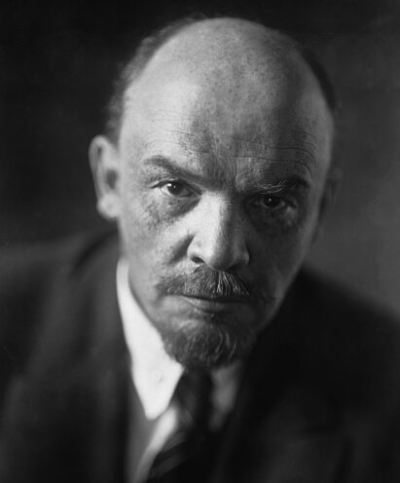
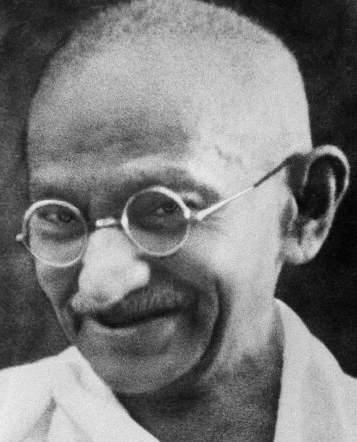

コメント